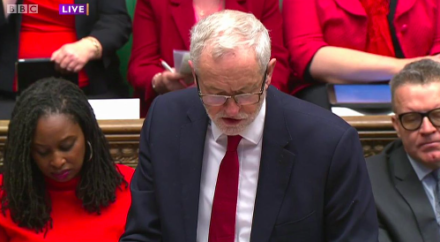
Jeremy Corbyn kicked off Prime Minister’s Questions with a necessary question on Amber Rudd following her weekend resignation over the Windrush crisis. He pointedly asked: “Did the Prime Minister feel the slightest pang of guilt when the former Home Secretary was forced to resign due to the failures of her predecessor?”
But Corbyn went on to ask Theresa May about, well, almost every significant Tory failure. The “positively Tiggerish” Chancellor’s poor economic growth, the impact of austerity on the NHS and schools, police cuts at a time of soaring violent crime, and finally rising council tax.
Some commentators wondered why he didn’t focus on the ongoing Windrush crisis, when people are still being affected by that dangerous combination of Home Office cruelty and inefficiency, or overseas doctor’s visas, after the Evening Standard revealed yesterday that May blocked requests to grant visas and fill staff shortages in the NHS.
In recent weeks the Labour leader has chosen to pick the standout issue of the week, a strategy that should allow him to pin down the Prime Minister on a particular policy or scandal. Yet he opted for the much-maligned scatter gun approach. Why?
Corbyn asking Theresa May #pmqs questions on different topics that can be packaged up for social media makes sense ahead of polling day: Labour circumvent the anachronistic ban on political broadcasting while polls are open and can keep campaigning online tomorrow.
— Jim Waterson (@jimwaterson) May 2, 2018
First, there’s the obvious reason: local elections are tomorrow. Yes, the back-and-forth on spending statistics wasn’t a thrilling watch, but Labour needed to gets its message out on every one of those key campaigning issues. That’s politics.
There’s another pragmatic reason. It’s true that as a viewer, single-topic PMQs are far more coherent. They almost make watching PMQs a not-unbearable experience. But those who aren’t forced to watch PMQs for work (that means everyone other than the politicos moaning on Twitter) generally don’t choose to do so.
Corbyn has done one question on Windrush, one on the NHS, one on education, one on policing, none of which were questions and now he is Shouting For The Clip. A full on 42 carat embarrassment. #PMQs
— Tom Peck (@tompeck) May 2, 2018
Ultimately the Labour leader’s job is both to hold the government to account and to communicate that opposition effectively to the British public. Corbyn’s strategy of phrasing questions so that they work well on social media – aka “Shouting For The Clip” – may simply be the most effective way of highlighting Tory failures to an audience that isn’t already following the minutiae of day-to-day political events.
Finally, the clincher. It has become an undeniable truth – a meme, even – that Theresa May can’t answer a question in a straightforward way. At PMQs last week, Corbyn stuck to the issues surrounding the Windrush scandal, and May answered almost every one of his questions with the same stock response. We can’t be surprised that the opposition leader might change tack when the Prime Minister never answers a question.




More from LabourList
Antonia Romeo appointed to lead civil service as new Cabinet Secretary
‘If Labour is serious about upskilling Britain, it must mobilise local businesses’
Stella Tsantekidou column: ‘What are we to make of the Labour Together scandal?’